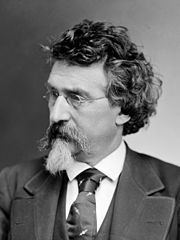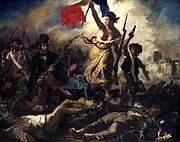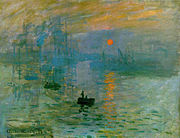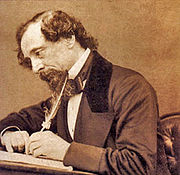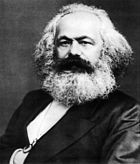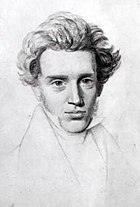19th century
From Wikipedia, the free encyclopedia
| Millennium: | 2nd millennium |
|---|---|
| Centuries: | 18th century · 19th century · 20th century |
| Decades: | 1800s 1810s 1820s 1830s 1840s 1850s 1860s 1870s 1880s 1890s |
| Categories: | Births – Deaths Establishments – Disestablishments |
The 19th century began on January 1, 1801 and ended on December 31, 1900, according to the Gregorian calendar. During the 19th century, the Spanish, Portuguese, Chinese, and Ottoman empires began to crumble, the Holy Roman Empire was dissolved, and the Mughal empire collapsed. This helped pave the way for The British Empire, The German Empire, and additionally The United States of America spread its influence internationally, this lead to each power engaging in conflicts and new advancements in exploration and various sciences.

After the Napoleonic Wars, the British Empire became the world's leading power, controlling one quarter of the world's population and one third of the land area. It enforced a Pax Britannica, encouraged trade, and battled rampant piracy. During this time the 19th century was an era of widespread invention and discovery, with significant developments in the understanding or manipulation of mathematics, physics, chemistry, biology, electricity, and metallurgy largely setting the groundworks for the comparably overwhelming and very rapid technological innovations which would take place the following century.
Modest advances in medicine and the understanding of human anatomy and disease prevention were also applicable to the 1800s, and were partly responsible for rapidly accelerating population growth in the western world. The introduction of railroads provided the first major advancement in land transportation for centuries, and their placement and application radically altered the ways people could live and rapidly and reliably obtain necessary commodities, fueling major urbanization movements in countries across the globe. Numerous cities worldwide surpassed populations of 1,000,000 or more during this century. The last remaining undiscovered landmasses of Earth, largely pacific island chains and atolls, were discovered during this century, and with the exception of the extreme zones of the Arctic and Antarctic, accurate and detailed maps of the globe were available by the 1890s.

Slavery was greatly reduced around the world. Following a successful slave revolt in Haiti, Britain forced the Barbary pirates to halt their practice of kidnapping and enslaving Europeans, banned slavery throughout its domain, and charged its navy with ending the global slave trade. Britain abolished slavery in 1834, America's 13th Amendment following their Civil War abolished slavery there in 1865, and in Brazil slavery was abolished in 1888 (see Abolitionism). Similarly, serfdom was abolished in Russia.
The 19th century was remarkable in the widespread formation of new settlement foundations which were particularly prevalent across North America and Australasia, with a significant proportion of the two continents' largest cities being founded at some point in the century.
[edit] Eras
- Industrial revolution
- British Regency, Victorian era (UK, British Empire)
- Bourbon Restoration, July Monarchy, French Second Republic, Second French Empire, French Third Republic (France)
- Belle Époque (Europe)
- Edo period, Meiji period (Japan)
- Qing Dynasty (China)
- Tanzimat, First Constitutional Era (Ottoman Empire)
- Russian Empire
- American Manifest Destiny
[edit] Events
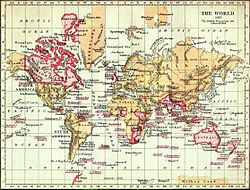
[edit] 1800–1809
- 1800: The Company of Surgeons are awarded their Royal Charter and became The Royal College of Surgeons of England.
- 1800: The inception of the Second Great Awakening for the United States.
- 1801: The Kingdom of Great Britain and the Kingdom of Ireland merge to form the United Kingdom.
- 1801: Ranjit Singh crowned as King of Punjab.
- 1801–15: Barbary War between the United States and the Barbary States of North Africa
- 1803: The United States buys out France's territorial claims in North America via the Louisiana Purchase. This begins the U.S.'s westward expansion to the Pacific referred to as its Manifest Destiny which involves annexing and conquering land from Mexico, Britain, and Native Americans.
- 1803: Saudi Wahhabists conquered Mecca and destroyed various shrines.
- 1804: Haiti gains independence from France and becomes the first black republic.
- 1804: Austrian Empire founded by Francis I.
- 1804–10: Fulani Jihad in Nigeria.
- 1804–15: Serbian revolution erupts against the Ottoman rule. Suzerainty of Serbia recognized in 1817.
- 1805–48: Muhammad Ali modernizes Egypt.
- 1806: Holy Roman Empire dissolved as a consequence of the Treaty of Lunéville.
- 1807: Kingdom of Great Britain declares the Slave Trade illegal.
- 1808–09: Russia conquers Finland from Sweden in the Finnish War.
- 1808–14: Spanish guerrillas fight in the Peninsular War.
- 1809: Napoleon strips the Teutonic Knights of their last holdings in Bad Mergentheim.
[edit] 1810s
- 1810: The University of Berlin, the world's first research university, is founded. Among its students and faculty are Hegel, Marx, and Bismarck. The German university reform proves to be so successful that its model is copied around the world (see History of European research universities).
- 1810s–20s: Most of the Latin American colonies free themselves from the Spanish and Portuguese Empires after the Mexican War of Independence and the South American Wars of Independence.
- 1812: The French invasion of Russia is a turning point in the Napoleonic Wars.
- 1812–15: War of 1812 between the United States and the United Kingdom
- 1813–1907: The contest between the British Empire and Imperial Russia for control of Central Asia is referred to as the Great Game.
- 1815: The Congress of Vienna redraws the European map. The Concert of Europe attempts to preserve this settlement, but it fails to stem the tide of liberalism and nationalism that sweeps over the continent.
- 1815: Napoleon's defeat at Waterloo brings a conclusion to the Napoleonic Wars and marks the beginning of a Pax Britannica which lasts until 1870.
- 1816: Year Without a Summer: Unusually cold conditions wreak havoc throughout the Northern Hemisphere, likely caused by the 1815 explosion of Mount Tambora.
- 1816–28: Shaka's Zulu kingdom becomes the largest in Southern Africa.
- 1817: Principality of Serbia becomes suzerain from the Ottoman Empire. Officially independent in 1867.
- 1819: The modern city of Singapore is established by the British East India Company.
- 1819; Théodore Géricault paints his masterpiece The Raft of the Medusa, and exhibits it in the French Salon of 1819 at the Louvre.
[edit] 1820s
- 1820: Liberia founded by the American Colonization Society for freed American slaves.
- 1821: Peru declares its independence from Spain
- 1821–27: Greece becomes the first country to break away from the Ottoman Empire after the Greek War of Independence.
- 1822: Prince Pedro of Portugal proclamated the Brazilian independence on September 7. On December 1, he was crowned as Emperor Dom Pedro I of Brazil
- 1823–87: The British Empire annexed Burma (now also called Myanmar) after three Anglo-Burmese Wars.
- 1825: Erie Canal opened connecting the Great Lakes to the Atlantic Ocean.
- 1826–28: After the final Russo-Persian War, the Persian Empire took back territory lost to Russia from the previous war.
- 1825–28: The Argentina-Brazil War results in the independence of Uruguay.
[edit] 1830s
- 1830: The Church of Jesus Christ of Latter-day Saints is established on April 6, 1830.
- 1830: July Revolution in France.
- 1830: The Belgian Revolution in the United Kingdom of the Netherlands led to the creation of Belgium.
- 1830: Greater Colombia dissolved and the nations of Colombia (including modern-day Panama), Ecuador, and Venezuela took its place.
- 1830 November Uprising in Poland against Russia.
- 1831: France invades and occupies Algeria.
- 1833: Slavery Abolition Act bans slavery throughout the British Empire.
- 1833–76: Carlist Wars in Spain.
- 1834: Spanish Inquisition officially ends.
- 1834–59: Imam Shamil's rebellion in Russian-occupied Caucasus.
- 1835–36: The Texas Revolution in Mexico resulted in the short-lived Republic of Texas.
- 1836: The Battle of the Alamo.
- 1837–1838: Rebellions of 1837 in Canada.
- 1837–1901: Queen Victoria's reign is considered the apex of the British Empire and is referred to as the Victorian era.
- 1838-40: Civil war in the Federal Republic of Central America led to the foundings of Guatemala, El Salvador, Honduras, Nicaragua, and Costa Rica.
- 1839-51: Uruguayan Civil War
- 1839-60: After two Opium Wars, France, the United Kingdom, the United States and Russia gained many concessions from China resulting in the decline of the Qing Dynasty.
[edit] 1840s
- 1840: New Zealand is founded, as the Treaty of Waitangi is signed by the Maori and British.
- 1843: Major Jasper Whitlock is born in Houston, Texas.
- 1844: First publicly funded telegraph line in the world - between Baltimore and Washington - sends demonstration message on May 24, ushering in the age of the telegraph.
- 1844: Millerite movement awaits the Second Advent of Jesus Christ on October 22. Christ's non-appearance becomes known as the Great Disappointment.
- 1844: Persian Prophet the Báb announces his revelation, founding Bábísm. He announced to the world of the coming of "He whom God shall make manifest." He is considered the forerunner of Bahá'u'lláh, the founder of the Bahá'í Faith.
- 1844: Dominican War of Independence from Haiti.
- 1845: Unification of the Kingdom of Tonga under Tāufaʻāhau (King George Tupou I)
- 1845-72: The New Zealand Land Wars
- 1845–49: The Irish Potato Famine led to the Irish diaspora.
- 1846–48: The Mexican-American War leads to Mexico's cession of much of the modern-day Southwestern United States.
- 1846–47: Mormon migration to Utah.
- 1847–1901: The Caste War of Yucatán.
- 1848: The Communist Manifesto published.
- 1848: Revolutions of 1848 in Europe
- 1848: Seneca Falls Convention is the first women's rights convention in the United States and leads to the battle for suffrage and women's legal rights.
- 1848-58: California Gold Rush
[edit] 1850s
- 1850: The Little Ice Age ends around this time.
- 1851: The Great Exhibition in London was the world's first international Expo or World's Fair.
- 1851–60s: Victorian gold rush in Australia
- 1851–64: The Taiping Rebellion in China is the bloodiest conflict of the century.
- 1854: The Convention of Kanagawa formally ends Japan's policy of isolation.
- 1854–56: Crimean War between France, the United Kingdom, the Ottoman Empire and Russia
- 1855: Bessemer process enables steel to be mass produced.
- 1856: World's first oil refinery in Romania
- 1857–58: Indian Rebellion of 1857
- 1859: The Origin of Species published.
[edit] 1860s
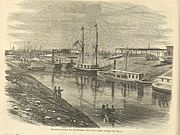
- 1861–65: American Civil War between the Union and seceding Confederacy
- 1861: Russia abolishes serfdom.
- 1861–67: French intervention in Mexico
- 1862–1877: Muslim Rebellion in northwest China.
- 1863: Bahá'u'lláh declares His station as "He whom God shall make manifest". This date is celebrated in the Bahá'í Faith as The Festival of Ridván.
- 1863: Formation of the International Red Cross is followed by the adoption of the First Geneva Convention in 1864.
- 1863–1865: Polish uprising against the Russian Empire.
- 1864-66: The Chincha Islands War was an attempt by Spain to regain its South American colonies.
- 1864-70: The War of the Triple Alliance ends Paraguayan ambitions for expansion and destroys much of the Paraguayan population.
- 1865-77: Reconstruction in the United States; Slavery is banned in the United States by the Thirteenth Amendment to the United States Constitution.
- 1865-April 9, 1865 Robert E. Lee surrenders the Army of Northern Virginia (26,765 troops) to Ulysses S. Grant at Appomattox Courthouse, Virginia, effectively ending the American Civil War.
- 1865-April 15, 1865, United States President Abraham Lincoln is assassinated while attending a performance at Fords theater, Washington, D.C..
- 1866: Successful transatlantic telegraph cable follows an earlier attempt in 1858.
- 1866: Austro-Prussian War results in the dissolution of the German Confederation and the creation of the North German Confederation and the Austrian-Hungarian Dual Monarchy.
- 1866-1868: Famine in Finland.
- 1866-69: After the Meiji Restoration, Japan embarks on a program of rapid modernization.
- 1867: The United States purchased Alaska from Russia.
- 1867: Canadian Confederation formed.
- 1867: Principality of Serbia passes the Constitution which defines its independent from Ottoman Empire. International recognition followed in 1878.
- 1869: First Transcontinental Railroad completed in United States.
- 1869: The Suez Canal opens linking the Mediterranean to the Red Sea.
[edit] 1870s

- 1870-71: The Franco-Prussian War results in the unifications of Germany and Italy, the collapse of the Second French Empire, the breakdown of Pax Britannica, and the emergence of a New Imperialism.
- 1871-1872: Famine in Persia is believed to have caused the death of 2 million.
- 1871-1914: Second Industrial Revolution
- 1870s-90s: Long Depression in Western Europe and North America
- 1872: Yellowstone National Park is created.
- 1873: Maxwell's A Treatise on Electricity and Magnetism published.
- 1874: The Société Anonyme Coopérative des Artistes Peintres, Sculpteurs, and Graveurs, better known today as the Impressionists organize and present their first public group exhibition at the Paris studio of the photographer Nadar.
- 1874: The British East India Company is dissolved.
- 1874-1875: First Republic in Spain.
- 1875-1900: 26 million Indians perished in India due to famine.
- 1876: The Bulgarian revolt against Ottoman rule.
- 1876-1879: 13 million Chinese died of famine in northern China.
- 1876-1914: The massive expansion in population, territory, industry and wealth in the United States is referred to as the Gilded Age.
- 1877: Great Railroad Strike in the United States may have been the world's first nationwide labor strike.
- 1877-78: Following the Russo-Turkish War, the Treaty of Berlin recognizes formal independence of the Principality of Serbia, Montenegro and Romania. Bulgaria becomes autonomous.
- 1878: First commercial telephone exchange in New Haven, Connecticut.
- 1879: Anglo-Zulu War in South Africa.

- 1879-83: Chile battles with Peru and Bolivia over Andean territory in the War of the Pacific.
[edit] 1880s
- 1880-1881: the First Boer War.
- 1881: First electrical power plant and grid in Godalming, Britain.
- 1881-1899: The Mahdist War in Sudan.
- 1883: Krakatoa volcano explosion.
- 1884-85: The Berlin Conference signals the start of the European "scramble for Africa". Attending nations also agree to ban trade in slaves.
- 1884-85: The Sino-French War led to the formation of French Indochina.
- 1885 : "The Strange Case of Dr. Jekyll and Mr. Hyde" by Robert Louis Stevenson is published.
- 1886: Russian-Circassian War ended with the defeat and the exile of many Circassians. Imam Shamil defeated.
- 1888 (August): Jack the Ripper is believed to have begun murdering.
- 1888 (November): Jack The ripper is believed to have murdered his last victim.
- 1888: Slavery banned in Brazil.
- 1889: Hazrat Mirza Ghulam Ahmad establishes the Ahmadi Muslim Community.
- 1889: End of the Brazilian Empire and the beginning of the Brazilian Republic
[edit] 1890s
- 1890: The Wounded Knee Massacre was the last battle in the American Indian Wars. This event represents the end of the American Old West.
- 1894-95: After the First Sino-Japanese War, China cedes Taiwan to Japan and grants Japan a free hand in Korea.
- 1895-1896: Ethiopia defeats Italy in the First Italo–Ethiopian War.
- 1896: Olympic games revived in Athens.
- 1896: Klondike Gold Rush in Canada.
- 1897: Gojong, or Emperor Gwangmu, proclaims the short-lived Korean Empire: lasts until 1910.
- 1898: The United States gains control of Cuba, Puerto Rico, and the Philippines after the Spanish-American War.
- 1898-1900: The Boxer Rebellion in China is suppressed by an Eight-Nation Alliance.
- 1898-1902: The One Thousand Days war in Colombia breaks out between the "Liberales" and "Conservadores," culminating with the loss of Panama in 1903.
- 1899: Second Boer War begins (-1902); Philippine-American War begins (-1913).
[edit] Significant people


- Clara Barton, nurse, pioneer of the American Red Cross
- Sitting Bull, a leader of the Lakota
- John Burroughs, Naturalist, conservationist, writer
- Davy Crockett, King of the wild frontier, folk hero, frontiersman, soldier and politician
- Jefferson Davis, Confederate States President
- William Gilbert Grace, English cricketer
- Baron Haussmann, civic planner
- Franz Joseph I of Austria, Emperor of Austria
- Chief Joseph, a leader of the Nez Percé
- Ned Kelly, Australian folk hero, and outlaw
- Elizabeth Kenny, Australian Nurse and found an Innovative Treatment of Polio
- Sándor Körösi Csoma, explorer of the Tibetan culture
- Abraham Lincoln, United States President
- Fitz Hugh Ludlow, writer and explorer
- John Muir, Naturalist, writer, preservationist
- Florence Nightingale, nursing pioneer
- Napoleon I, First Consul and Emperor of the French
- Commodore Perry, U.S. Naval commander, opened the door to Japan
- Dr. Jose P. Rizal, Filipino hero, novelist, liberator
- Sacagawea, Important aide to Lewis&Clark
- Ignaz Semmelweis, proponent of hygienic practices
- Dr. John Snow, the founder of epidemiology
- F R Spofforth, Australian cricketer
- Queen Victoria, Queen of the United Kingdom
- William Wilberforce, Abolitionist, Philanthropist
- Hong Xiuquan inspired China's Taiping Rebellion, perhaps the bloodiest civil war in human history
[edit] Show business and theatre


- David Belasco, actor, playwright, theatrical producer
- Sarah Bernhardt, actress
- Edwin Booth, actor
- Dion Boucicault, playwright
- Mrs Patrick Campbell, actress
- Anton Chekhov, playwright
- Buffalo Bill Cody, Wild West legend, and showman
- Baptiste Deburau, Bohemian-French actor and mime.
- Eleonora Duse, actress
- Henrik Ibsen, playwright
- Edmund Kean, actor
- Charles Kean, actor
- Frédérick Lemaître, actor
- Jenny Lind, opera singer called the Swedish Nightingale
- Céleste Mogador, dancer
- Lola Montez, exotic dancer
- Adelaide Neilson, actress
- Annie Oakley, Wild West, sharp-shooter
- George Bernard Shaw, playwright
- Edward Askew Sothern, actor
- Ellen Terry, actress
[edit] Athletics

- Cap Anson, baseball player
- Gentleman Jim Corbett, heavyweight boxer
- Big Ed Delahanty, baseball player
- Bob Fitzsimmons, heavyweight boxer
- Pud Galvin, baseball player
- Olympic Games, 1894 the IOC is formed, and the first Summer Olympics games are held in Athens, Greece in 1896
- Peter Jackson, heavyweight boxer
- James J. Jeffries, heavyweight boxer
- Old Hoss Radbourn, baseball player
- Tom Sharkey, heavyweight boxer
- John L. Sullivan, heavyweight boxer
- John Montgomery Ward, baseball player
- Evangelos Zappas, Founder of the International Modern Olympic Games
[edit] Business
- John Jacob Astor III, Real Estate
- Andrew Carnegie, Industrialist, philanthropist
- Jay Cooke, Finance
- Henry Clay Frick, Industrialist, art collector
- Jay Gould, Railroad developer
- Meyer Guggenheim Family patriarch, mining
- Daniel Guggenheim (copper)
- E. H. Harriman, Railroads
- Henry O. Havemeyer (sugar), art collector
- George Hearst, Gold
- James J. Hill (railroads) - The Empire Builder
- Andrew W. Mellon, Industrialist, philanthropist, art collector
- J.P. Morgan, banker, art collector
- George Mortimer Pullman (railroads)
- Charles Pratt Oil, founder of the Pratt Institute
- John D. Rockefeller, Oil, Business tycoon, philanthropist
- Levi Strauss, clothing manufacturer
- Cornelius Vanderbilt, Shipping, Railroads
[edit] Famous and infamous personalities

- William Bonney aka Henry McCarty aka Billy the kid, Wild West, outlaw
- John Wilkes Booth, assassin
- James Bowie, Soldier, Texan who died at the Alamo, invented the Bowie knife
- Jim Bridger, Wild West, Mountain man
- John Brown, a fanatical abolitionist who led an armed insurrection at Harpers Ferry, Virginia, in 1859.
- Kit Carson, Wild West, frontiersman
- Cochise, Chiricahua Apache leader
- George Armstrong Custer, soldier, whose last stand was in the Wild West
- Wyatt Earp, Wild West, lawman
- Pat Garrett, Wild West, lawman
- Charles J. Guiteau, assassin
- Jack The Ripper, Serial Killer whose identity remains unknown.
- Geronimo, Chiricahua Apache leader
- Wild Bill Hickock, Legendary Wild West, lawman
- Doc Holliday, Legendary Wild West, gambler, gunfighter
- Crazy Horse, War leader of the Lakota
- Frank James, Wild West, outlaw, older brother of Jesse
- Jesse James, Legendary Wild West, outlaw
- Calamity Jane, Frontierswoman
- Bat Masterson, Wild West, lawman, gambler, newspaperman
- Allan Pinkerton, spy, founded the Pinkerton Agency, first detective agency in the United States
- William Poole aka Bill the Butcher, member of the New York City gang, the Bowery Boys, a bare-knuckle boxer, and a leader of the Know Nothing political movement.
- Belle Starr Legendary Wild West, female outlaw
- Nat Turner, led a slave rebellion in Southampton County, Virginia during August 1831.
[edit] Anthropology, archaeology, scholars
- Churchill Babington, Archaeology
- Adolph Francis Alphonse Bandelier, Archaeology
- Franz Boas, Anthropology
- Charles Étienne Brasseur de Bourbourg, Archaeology
- Louis Agassiz Fuertes, Ornithology
- George Bird Grinnell, Anthropology
- Joseph LeConte, Scholar, preservationist
- Nicholai Miklukho-Maklai, Anthropology
- Clinton Hart Merriam, Zoology
- Lewis H. Morgan, Anthropology
- Jules Etienne Joseph Quicherat, Archaeology
- Robert Ridgway, Ornithology
- Edward Burnett Tylor, Anthropology
- Karl Verner, Linguist
[edit] Journalists, missionaries, explorers
- Roald Amundsen, explorer
- Samuel Baker, explorer
- Thomas Baines, artist, explorer
- Richard Francis Burton, explorer
- The Lewis&Clark expedition, exploration
- Frederick Samuel Dellenbaugh, explorer
- Percy Fawcett, adventurer, explorer, proto-Indiana Jones
- Horace Greeley, journalist
- Peter Jones (missionary), Canadian Methodist minister, and go-between between Christians and his fellow Mississaugas and other Indian tribes.
- Adoniram Judson, missionary
- Sir John Kirk, explorer, physician, companion of David Livingston
- Sir Joseph Dalton Hooker, botanist, explorer, friend of Charles Darwin
- Sir William Jackson Hooker, botanist, explorer, father of Sir Joseph Dalton Hooker
- David Livingstone, missionary
- Thomas Nast, journalist, caricaturist and editorial cartoonist
- Robert Peary, explorer
- John Hanning Speke, explorer
- Henry M. Stanley, journalist
- John L. O'Sullivan, journalist who coined Manifest Destiny
[edit] Photography
- Ottomar Anschütz, chronophotographer
- Mathew Brady, documented the American Civil War
- Edward S. Curtis, documented the American West notably Native Americans
- Louis Daguerre, inventor of daguerreotype process of photography, chemist
- Thomas Eakins, pioneer motion photographer
- George Eastman, inventor of the roll of film
- Hércules Florence, pioneer inventor of photography
- Auguste and Louis Lumière, pioneer filmmakers, inventors
- Étienne-Jules Marey, pioneer motion photographer, chronophotographer
- Eadweard Muybridge, pioneer motion photographer, chronophotographer
- Nadar aka Gaspard-Félix Tournachon, portrait photographer
- Nicéphore Niépce, pioneer inventor of photography
- Louis Le Prince, motion picture inventor and pioneer filmmaker
- William Fox Talbot, inventor of the negative / positive photographic process.
[edit] Visual artists, painters, sculptors
The Realism and Romanticism of the early 19th century gave way to Impressionism and Post-Impressionism in the later half of the century, with Paris being the dominant art capital of the world. In the United States the Hudson River School was prominent. 19th century painters included:
- Albert Bierstadt
- William Blake
- Mary Cassatt
- Camille Claudel
- Paul Cezanne
- Frederic Edwin Church
- Thomas Cole
- John Constable
- Camille Corot
- Gustave Courbet
- Honoré Daumier
- Edgar Degas
- Eugène Delacroix
- Thomas Eakins
- Caspar David Friedrich
- Paul Gauguin
- Théodore Géricault
- Vincent van Gogh
- Ando Hiroshige
- Hokusai
- Winslow Homer
- Jean Auguste Dominique Ingres
- Édouard Manet
- Claude Monet
- Gustave Moreau
- Berthe Morisot
- Edvard Munch
- Camille Pissarro
- Pierre-Auguste Renoir
- Auguste Rodin
- Albert Pinkham Ryder
- John Singer Sargent
- Georges Seurat
- Henri de Toulouse-Lautrec
- Joseph Mallord William Turner
- James Abbott McNeill Whistler
- Tsukioka Yoshitoshi
[edit] Music
Sonata form matured during the Classical era to become the primary form of instrumental compositions throughout the 19th century. Much of the music from the nineteenth century was referred to as being in the Romantic style. Many great composers lived through this era such as Ludwig van Beethoven, Franz Liszt, Frédéric Chopin, Piotr Ilyich Tchaikovsky and Richard Wagner. The list includes:
- Ludwig van Beethoven
- Hector Berlioz
- Georges Bizet
- Arnold Bocklin
- Alexander Borodin
- Johannes Brahms
- Anton Bruckner
- Frédéric Chopin
- Claude Debussy
- Antonín Dvořák
- Edvard Grieg
- Scott Joplin
- Gustav Mahler
- Franz Liszt
- Felix Mendelssohn
- Modest Mussorgsky
- Jacques Offenbach
- Niccolò Paganini
- Camille Saint-Saëns
- Antonio Salieri
- Franz Schubert
- Robert Schumann
- Gilbert and Sullivan
- Piotr Ilyich Tchaikovsky
- Giuseppe Verdi
- Richard Wagner
[edit] Literature




On the literary front the new century opens with Romanticism, a movement that spread throughout Europe in reaction to 18th-century rationalism, and it develops more or less along the lines of the Industrial Revolution, with a design to react against the dramatic changes wrought on nature by the steam engine and the railway. William Wordsworth and Samuel Taylor Coleridge are considered the initiators of the new school in England, while in the continent the German Sturm und Drang spreads its influence as far as Italy and Spain.
French arts had been hampered by the Napoleonic Wars but subsequently developed rapidly. Modernism began.
The Goncourts and Emile Zola in France and Giovanni Verga in Italy produce some of the finest naturalist novels. Italian naturalist novels are especially important in that they give a social map of the new unified Italy to a people that until then had been scarcely aware of its ethnic and cultural diversity. On February 21, 1848, Karl Marx and Friedrich Engels published the Communist Manifesto.
There was a huge literary output during the 19th century. Some of the most famous writers included the Russians Leo Tolstoy, Anton Chekov and Fyodor Dostoevsky; the English Charles Dickens, John Keats, and Jane Austen; the Scottish Sir Walter Scott; the Irish Oscar Wilde; the Americans Edgar Allan Poe, Ralph Waldo Emerson, and Mark Twain; and the French Victor Hugo, Honoré de Balzac, Jules Verne and Charles Baudelaire. Some other important writers of note included:
- Leopoldo Alas
- Hans Christian Andersen
- Machado de Assis
- Jane Austen
- Gertrudis Gómez de Avellaneda
- Gustavo Adolfo Bécquer
- Elizabeth Barret Browning
- Anne Brontë
- Charlotte Brontë
- Emily Brontë
- Georg Büchner
- Lord Byron
- Rosalía de Castro
- François-René de Chateaubriand
- Kate Chopin
- Samuel Taylor Coleridge
- James Fenimore Cooper
- Stephen Crane
- Eduard Douwes Dekker
- Emily Dickinson
- Charles Dickens
- Arthur Conan Doyle
- Alexandre Dumas, père (1802-1870)
- George Eliot
- Ralph Waldo Emerson
- Gustave Flaubert
- Margaret Fuller
- Elizabeth Gaskell
- Johann Wolfgang von Goethe
- Nikolai Gogol
- Juana Manuela Gorriti
- Brothers Grimm
- Henry Rider Haggard
- Thomas Hardy
- Francis Bret Harte
- Nathaniel Hawthorne
- Friedrich Hölderlin
- Heinrich Heine
- Henrik Ibsen
- Washington Irving
- Henry James
- John Keats
- Caroline Kirkland
- Jules Laforgue
- Giacomo Leopardi
- Stéphane Mallarmé
- Alessandro Manzoni
- José Martí
- Clorinda Matto de Turner
- Herman Melville
- Friedrich Nietzsche
- Manuel González Prada
- Aleksandr Pushkin
- Arthur Rimbaud
- John Ruskin
- George Sand (Amandine-Aurore-Lucile Dupin)
- Mary Shelley
- Percy Shelley
- Stendhal (Marie-Henri Beyle)
- Robert Louis Stevenson
- Bram Stoker
- Harriet Beecher Stowe
- Alfred, Lord Tennyson
- Henry David Thoreau
- Mark Twain
- Paul Verlaine
- Jules Verne
- Lew Wallace
- HG Wells
- Walt Whitman
- William Wordsworth
- Émile Zola
- José Zorrilla
[edit] Science

The 19th century saw the birth of science as a profession; the term scientist was coined in 1833 by William Whewell[1]. Among the most influential ideas of the 19th century were those of Charles Darwin, who in 1859 published the book The Origin of Species, which introduced the idea of evolution by natural selection. Louis Pasteur made the first vaccine against rabies, and also made many discoveries in the field of chemistry, including the asymmetry of crystals. Thomas Alva Edison gave the world a practical everyday lightbulb. Karl Weierstrass and other mathematicians also carried out the arithmetization of analysis. But the most important step in science at this time was the ideas formulated by Michael Faraday and James Clerk Maxwell. Their work changed the face of physics and made possible for new technology to come about. Other important 19th century scientists included:
- Amedeo Avogadro, physicist
- Johann Jakob Balmer, mathematician, physicist
- Henri Becquerel, physicist
- Alexander Graham Bell, inventor
- Ludwig Boltzmann, physicist
- János Bolyai, mathematician
- Louis Braille, inventor of braille
- Robert Bunsen, chemist
- Marie Curie, physicist, chemist
- Pierre Curie, physicist
- Gottlieb Daimler, engineer, industrial designer and industrialist
- Christian Doppler, physicist, mathematician
- Thomas Edison, inventor
- Michael Faraday, scientist
- Léon Foucault, physicist
- Gottlob Frege, mathematician, logician and philosopher
- Sigmund Freud, the father of psychoanalysis
- Carl Friedrich Gauss, mathematician, physicist, astronomer
- Josiah Willard Gibbs, physicist
- Ernst Haeckel, biologist
- Heinrich Hertz, physicist
- Alexander von Humboldt, naturalist, explorer
- Robert Koch, physician, bacteriologist
- Justus von Liebig, chemist
- Nikolai Lobachevsky, mathematician
- James Clerk Maxwell, physicist
- Wilhelm Maybach, car-engine and automobile designer and industrialist
- Gregor Mendel, biologist
- Dmitri Mendeleev, chemist
- Samuel Morey, inventor
- Alfred Nobel, chemist, engineer, inventor
- Louis Pasteur, microbiologist and chemist
- Santiago Ramón y Cajal, biologist
- Bernhard Riemann, mathematician
- William Emerson Ritter, biologist
- Nikola Tesla, inventor
- William Thomson, Lord Kelvin, physicist
[edit] Philosophy and religion



The 19th century was host to a variety of religious and philosophical thinkers, including:
- Mirza Ghulam Ahmad claimed to be the promised Messiah and Mahdi, founded the Ahmadiyya.
- Bahá'u'lláh founded the Bahá'í Faith in Persia
- Mikhail Bakunin, anarchist
- William Booth, social reformer, founder of the Salvation Army
- Auguste Comte, philosopher
- Mary Baker Eddy, religious leader, founder of Christian Science
- Friedrich Engels, political philosopher
- Georg Wilhelm Friedrich Hegel, philosopher
- Søren Kierkegaard, philosopher
- Karl Marx, political philosopher
- John Stuart Mill, philosopher
- William Morris, social reformer
- Friedrich Nietzsche, philosopher
- Nikolai (Nicholas) of Japan, religious leader, introduced Eastern Orthodoxy into Japan
- Ramakrishna Paramahamsa, Hindu mystic
- Claude Henri de Rouvroy, Comte de Saint-Simon, founder of French socialism
- Arthur Schopenhauer, philosopher
- Joseph Smith, Jr. and Brigham Young, founders of Mormonism
- Ayya Vaikundar, initiator of the belief system of Ayyavazhi
- Ellen White religious author and co-founder of the Seventh-day Adventist Church
[edit] Politics and the Military
- Susan B. Anthony, U.S. women's rights advocate
- Otto von Bismarck, German chancellor
- Napoleon Bonaparte, French general, first consul and emperor
- John C. Calhoun, U.S. senator
- Henry Clay, U.S. statesman, "The Great Compromiser"
- Jefferson Davis, President of the Confederate States of America just before and during the American Civil War.
- Benjamin Disraeli, novelist and politician
- Frederick Douglass, U.S. abolitionist spokesman
- Ferdinand VII of Spain
- Joseph Fouché, French politician
- John C. Frémont, Explorer, Governor of California
- Giuseppe Garibaldi, unifier of Italy and Piedmontese soldier
- Isabella II of Spain
- Gojong of Joseon, Korean emperor
- William Lloyd Garrison, U.S. abolitionist leader
- William Ewart Gladstone, British prime minister
- Ulysses S. Grant, U.S. general and president
- George Hearst, U.S. Senator and father of William Randolph Hearst
- Theodor Herzl, founder of modern political Zionism
- Andrew Jackson, U.S. general and president
- Thomas Jefferson, American statesman, philosopher, and president
- Lajos Kossuth, Hungarian governor; leader of the war of independence
- Robert E. Lee, Confederate general
- Libertadores, Latin American liberators
- Abraham Lincoln, U.S. president; led the nation during the American Civil War
- Sir John A. Macdonald, Canada, first Prime Minister of Canada
- Klemens von Metternich, Austrian Chancellor
- Mutsuhito, Japanese emperor
- Napoleon III
- Cecil Rhodes
- Theodore Roosevelt, Explorer, Naturalist, future President of The United States
- William Tecumseh Sherman, Union general during the American Civil War
- Fulwar Skipwith, the first and only president of the short lived Republic of West Florida
- Leland Stanford, Governor of California, U.S. Senator, entrepreneur
- István Széchenyi, aristocrat, leader of the Hungarian reform movement
- Charles Maurice de Talleyrand, French politician
- Harriet Tubman, African-American abolitionist, humanitarian, played a part in the Underground Railroad
- William M. Tweed, aka Boss Tweed, influential New York City politician, head of Tammany Hall
- Queen Victoria, British monarch
- Hong Xiuquan, revolutionary, self-proclaimed Son of God
- Tokugawa Yoshinobu, Japanese Shogun (The Last Shogun)
[edit] Worst Person
In the BBC's history poll of worst people in history, the 19th century's worst in Britain was the infamous Serial killer Jack The Ripper, an unidentified killer who murdered many Prostitutes, five, in the autumn of 1888.
[edit] See also
- 19th century in film
- 19th century in games
- 19th century inventions
- 19th-century philosophy
- Capitalism in the nineteenth century
- France in the nineteenth century
- List of wars 1800–1899
- Mid-nineteenth century Spain
- Nineteenth century theatre
- Timeline of 19th century Islamic history
- Russian history, 1855–1892
- Victorian Era
[edit] Eras, Epochs, Decades and years
|
||||||||||||||||||||
|
|||||
|
||||||||||||||||||||||||||||||||||||||||||||||||||||||||||||||||||||||||||||||||||||||||||||||||||||||||||||||||||||||||||||||
[edit] References
- ^ "William Whewell". Stanford University. http://www.science.uva.nl/~seop/entries/whewell/. Retrieved on 2008-03-03.








